You are currently here:
New Economy - Vision 2014
03.12.2013.
18:30
Hotel Metropol Palace, Belgrade

Serbian Minister of Economy Sasa Radulovic stated late on Tuesday that the Serbian government is determined to conduct the necessary reforms to improve the situation in the economy sector, adding that citizens will feel the real betterment brought about by the economic measures in 2015.
At a business meeting entitled "New Economy- Vision 2014", Radulovic said that the credibility of the government will be assessed according to the 2014 budget, the success in the adoption of four key laws and the success in clearing up balance sheets in public enterprises and launching the privatisation process.
Radulovic said that the privatisation and bankruptcy law and the law on planning and construction would be adopted by the end of the year, while the labour law should be adopted in January which would improve the conditions for employment.
The adoption of amendments to the key laws will contribute to improvement of the overall business environment in the country and attract foreign investors, the minister said.
He said that the labour taxes will be reduced because this point is the key generator of grey economy in Serbia together with the valid Labour Law.
Radulovic noted that privatisation of 153 restructuring companies should be completed by the end of 2014 as these employ 50,000 people, which is rather costly for the budget.
A lot of people will lose their jobs in the restructuring process and the year of 2014 will be rather difficult, he said.
Nevertheless, the minister noted that the first results of the measures the government intends to carry out would produce results in the next year while citizens should feel genuine betterment in 2015.
The Serbian government has made progress and recognized the importance of economic reforms for creating a successful business environment, and if the country continues in that direction, it will attract more foreign investments, said the U.S. and German ambassadors to Serbia, Michael Kirby and Heinz Wilhelm respectively.
The Serbian government brought about significant changes through its own reshuffle, which confirms that it has the potential for further progress, Kirby said at a conference titled "New Economy - Vision 2014" on Tuesday evening.
He noted that the U.S. is trying to assist Serbia in carrying out the reforms and passing a new labor law, laws in the field of agriculture, and a law on planning and construction.
German Ambassador Wilhelm underscored that his country is Serbia's largest trading partner, adding that German companies hired over 20,000 people in Serbia.
He noted that political conditions have also improved in Serbia, which is a result of the beginning of the resolution of the Kosovo issue, and the country has also taken many initiatives and became "a constructive actor in the region".
If that continues, Serbia will attract more German and other foreign companies, Ambassador Wilhelm said.
Freek Janmaat, head of the European Integration Section with the EU Delegation to Serbia, said that at this moment, no country in the Western Balkans, which is a candidate for EU membership, can consider itself a functional market economy.
When it comes to Serbia, Janmaat said that there are problems with public enterprises, a high level of government subsidies and government-controlled prices.
Noting that structural reforms have already started in Serbia, Janmaat said that Serbia's competitiveness could be expected to be at a satisfactory level by the time it joins the EU.
At a business meeting entitled "New Economy- Vision 2014", Radulovic said that the credibility of the government will be assessed according to the 2014 budget, the success in the adoption of four key laws and the success in clearing up balance sheets in public enterprises and launching the privatisation process.
Radulovic said that the privatisation and bankruptcy law and the law on planning and construction would be adopted by the end of the year, while the labour law should be adopted in January which would improve the conditions for employment.
The adoption of amendments to the key laws will contribute to improvement of the overall business environment in the country and attract foreign investors, the minister said.
He said that the labour taxes will be reduced because this point is the key generator of grey economy in Serbia together with the valid Labour Law.
Radulovic noted that privatisation of 153 restructuring companies should be completed by the end of 2014 as these employ 50,000 people, which is rather costly for the budget.
A lot of people will lose their jobs in the restructuring process and the year of 2014 will be rather difficult, he said.
Nevertheless, the minister noted that the first results of the measures the government intends to carry out would produce results in the next year while citizens should feel genuine betterment in 2015.
The Serbian government has made progress and recognized the importance of economic reforms for creating a successful business environment, and if the country continues in that direction, it will attract more foreign investments, said the U.S. and German ambassadors to Serbia, Michael Kirby and Heinz Wilhelm respectively.
The Serbian government brought about significant changes through its own reshuffle, which confirms that it has the potential for further progress, Kirby said at a conference titled "New Economy - Vision 2014" on Tuesday evening.
He noted that the U.S. is trying to assist Serbia in carrying out the reforms and passing a new labor law, laws in the field of agriculture, and a law on planning and construction.
German Ambassador Wilhelm underscored that his country is Serbia's largest trading partner, adding that German companies hired over 20,000 people in Serbia.
He noted that political conditions have also improved in Serbia, which is a result of the beginning of the resolution of the Kosovo issue, and the country has also taken many initiatives and became "a constructive actor in the region".
If that continues, Serbia will attract more German and other foreign companies, Ambassador Wilhelm said.
Freek Janmaat, head of the European Integration Section with the EU Delegation to Serbia, said that at this moment, no country in the Western Balkans, which is a candidate for EU membership, can consider itself a functional market economy.
When it comes to Serbia, Janmaat said that there are problems with public enterprises, a high level of government subsidies and government-controlled prices.
Noting that structural reforms have already started in Serbia, Janmaat said that Serbia's competitiveness could be expected to be at a satisfactory level by the time it joins the EU.
 registration
registration
Serbian Minister of Economy Sasa Radulovic stated late on Tuesday that the Serbian government is determined to conduct the necessary reforms to improve the situation in the economy sector, adding that citizens will feel the real betterment brought about by the economic measures in 2015.
At a business meeting entitled "New Economy- Vision 2014", Radulovic said that the credibility of the government will be assessed according to the 2014 budget, the success in the adoption of four key laws and the success in clearing up balance sheets in public enterprises and launching the privatisation process.
Radulovic said that the privatisation and bankruptcy law and the law on planning and construction would be adopted by the end of the year, while the labour law should be adopted in January which would improve the conditions for employment.
The adoption of amendments to the key laws will contribute to improvement of the overall business environment in the country and attract foreign investors, the minister said.
He said that the labour taxes will be reduced because this point is the key generator of grey economy in Serbia together with the valid Labour Law.
Radulovic noted that privatisation of 153 restructuring companies should be completed by the end of 2014 as these employ 50,000 people, which is rather costly for the budget.
A lot of people will lose their jobs in the restructuring process and the year of 2014 will be rather difficult, he said.
Nevertheless, the minister noted that the first results of the measures the government intends to carry out would produce results in the next year while citizens should feel genuine betterment in 2015.
The Serbian government has made progress and recognized the importance of economic reforms for creating a successful business environment, and if the country continues in that direction, it will attract more foreign investments, said the U.S. and German ambassadors to Serbia, Michael Kirby and Heinz Wilhelm respectively.
The Serbian government brought about significant changes through its own reshuffle, which confirms that it has the potential for further progress, Kirby said at a conference titled "New Economy - Vision 2014" on Tuesday evening.
He noted that the U.S. is trying to assist Serbia in carrying out the reforms and passing a new labor law, laws in the field of agriculture, and a law on planning and construction.
German Ambassador Wilhelm underscored that his country is Serbia's largest trading partner, adding that German companies hired over 20,000 people in Serbia.
He noted that political conditions have also improved in Serbia, which is a result of the beginning of the resolution of the Kosovo issue, and the country has also taken many initiatives and became "a constructive actor in the region".
If that continues, Serbia will attract more German and other foreign companies, Ambassador Wilhelm said.
Freek Janmaat, head of the European Integration Section with the EU Delegation to Serbia, said that at this moment, no country in the Western Balkans, which is a candidate for EU membership, can consider itself a functional market economy.
When it comes to Serbia, Janmaat said that there are problems with public enterprises, a high level of government subsidies and government-controlled prices.
Noting that structural reforms have already started in Serbia, Janmaat said that Serbia's competitiveness could be expected to be at a satisfactory level by the time it joins the EU.
At a business meeting entitled "New Economy- Vision 2014", Radulovic said that the credibility of the government will be assessed according to the 2014 budget, the success in the adoption of four key laws and the success in clearing up balance sheets in public enterprises and launching the privatisation process.
Radulovic said that the privatisation and bankruptcy law and the law on planning and construction would be adopted by the end of the year, while the labour law should be adopted in January which would improve the conditions for employment.
The adoption of amendments to the key laws will contribute to improvement of the overall business environment in the country and attract foreign investors, the minister said.
He said that the labour taxes will be reduced because this point is the key generator of grey economy in Serbia together with the valid Labour Law.
Radulovic noted that privatisation of 153 restructuring companies should be completed by the end of 2014 as these employ 50,000 people, which is rather costly for the budget.
A lot of people will lose their jobs in the restructuring process and the year of 2014 will be rather difficult, he said.
Nevertheless, the minister noted that the first results of the measures the government intends to carry out would produce results in the next year while citizens should feel genuine betterment in 2015.
The Serbian government has made progress and recognized the importance of economic reforms for creating a successful business environment, and if the country continues in that direction, it will attract more foreign investments, said the U.S. and German ambassadors to Serbia, Michael Kirby and Heinz Wilhelm respectively.
The Serbian government brought about significant changes through its own reshuffle, which confirms that it has the potential for further progress, Kirby said at a conference titled "New Economy - Vision 2014" on Tuesday evening.
He noted that the U.S. is trying to assist Serbia in carrying out the reforms and passing a new labor law, laws in the field of agriculture, and a law on planning and construction.
German Ambassador Wilhelm underscored that his country is Serbia's largest trading partner, adding that German companies hired over 20,000 people in Serbia.
He noted that political conditions have also improved in Serbia, which is a result of the beginning of the resolution of the Kosovo issue, and the country has also taken many initiatives and became "a constructive actor in the region".
If that continues, Serbia will attract more German and other foreign companies, Ambassador Wilhelm said.
Freek Janmaat, head of the European Integration Section with the EU Delegation to Serbia, said that at this moment, no country in the Western Balkans, which is a candidate for EU membership, can consider itself a functional market economy.
When it comes to Serbia, Janmaat said that there are problems with public enterprises, a high level of government subsidies and government-controlled prices.
Noting that structural reforms have already started in Serbia, Janmaat said that Serbia's competitiveness could be expected to be at a satisfactory level by the time it joins the EU.
-
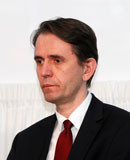
Saša Radulović
Minister of Economy, Republic of Serbia
-
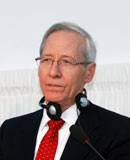
NJ.E. Michael Kirby
U.S. Ambassador to Serbia
-
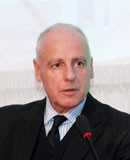
H.E. Heinz Wilhelm
Ambassador of the Federal Republic of Germany in Serbia
-
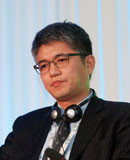
Daehaeng Kim
IMF Resident Representative for Serbia
-
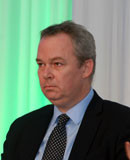
Tony Verheijen
World Bank, Country Manager for Serbia Europe and Central Asia
-
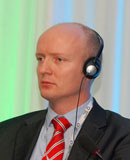
Freek Janmaat
Head of Section for European Integration of the EU Delegation in Serbia
-
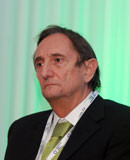
Pavle Petrović
President of the Fiscal Council, Republic of Serbia
-
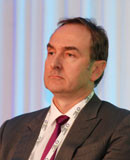
Zoran Petrović
Chairman of the Executive Board of Raiffeisen Bank









